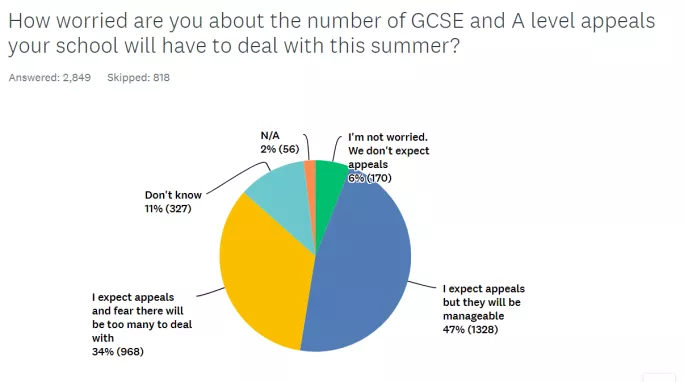More than a third of teachers expect to be hit with an unmanageable number of appeals when this year’s GCSE and A level results are published, according to a Tes survey.
The findings come in the week that tens of thousands of pupils are poised to find out their teacher-assessed grades, with A Level results due today and GCSEs following on Thursday.
In the Tes survey of more than 2,800 grading teachers, 34 per cent reported that they expected to face GCSE and A level appeals in their school but were worried there would be too many to manage.
GCSEs 2021: Schools expecting ‘huge’ number of appeals
GCSEs 2021: Cut appeals with transparency, schools told
GCSEs and A levels: Schools have ‘no discretion’ on who appeals
However, 47 per cent of respondents said that while they expected appeals, “they will be manageable”.
The findings follow fears raised by school leaders about very high numbers of appeals. In July, Geoff Barton, general secretary of the Association of Schools and Colleges, warned MPs that schools were facing a “huge” number of appeals this summer, as some parents threaten to get lawyers involved over grades.
Some respondents to the Tes survey raised concerns over further parental pressure being brought to bear on them when results are published.
A secondary languages teacher working in the state sector said: “It is unclear to me on what grounds someone should be able to overrule a TAG when there are so many variables in the system. But I fear that parents will try to exercise direct pressure on teachers.”
And another respondent raised fears over possible legal challenges from parents. Heads have recently criticised law forms for lining up to “pick over” teachers’ judgements of students’ GCSE and A-level grades this year, while teachers’ leaders have condemned the practice as “immoral”.
An assistant head grading maths GCSEs and A levels said: “I am particularly concerned about legally backed appeals. If I am confronted with any form of legal action I will without hesitation up the grade to avoid the confrontation.”
And a head of department grading languages said: “I am confident that I have the evidence to deal with any appeals, but I am very concerned about the effect the parent/school relationships as appeals will inevitably feel more personal and directed at individual teacher’s judgement. I think this will be extremely stressful to deal with”.
A head of Year 13 added that they were “already receiving a mix of subtle and downright aggressive threats” regarding appeals.
And while some respondents did not feel the process would be too difficult for schools, they still anticipated teacher blame.
“I am expecting there to be appeals, and as the grading has been named teacher assessed grades I feel I know where the disgruntlement will be directed,” a head of department for design and technology said.
However, they added: “Each centre will have to deal with the appeals, so to say there will be too many to deal with is a nonsense, schools will make it happen, overworking the already overworked.”
Ofqual and the Joint Council for Qualifications have been contacted for comment.





